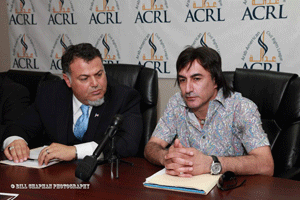
|
| Mokdad with Ayad announcing the lawsuit in 2013 |
CINCINNATI — The U.S. Court of Appeals for the Sixth Circuit ruled Monday that the federal district court should consider a legal complaint against the No-Fly List.
The appellate court issued a published opinion in favor of Saeb Mokdad, a concert promoter who sued the federal government challenging the constitutionality of the implementation of the No-Fly List.
Mokdad is a U.S. citizen with a clean record who has been unable to travel to Lebanon to visit family or conduct business because of the list.
According to the Arab American Civil Rights League (ACRL), whose chairman is representing Mokdad, the court’s decision sets a precedent against the No-Fly List, which civil rights organizations say punishes U.S. citizens without due process.
The Sixth Circuit Court of Appeals held as a matter of law that the U.S. District courts have jurisdiction to hear challenges to the No-Fly List.
ACRL Chairman Nabih Ayad said the decision confirms that the No-Fly List is unconstitutional.
“Today is a good day for our Constitution, a good day for Arab Americans, and a good day for justice across this nation,” Ayad said in a statement Monday.
He added that the court of appeals dealt a “huge blow” to the federal government’s harassment against Arab Americans.
“The message the Court sent today cannot be clearer: We are a nation of laws, and if the government will not hold itself accountable, we the people will defend our Constitutionally guaranteed rights,” he said.
Mokdad filed a lawsuit against the federal government in May 2013 after federal agents prevented him from boarding his Beirut-bound plane from Detroit Metropolitan Airport.
“I felt like I’m a criminal, and I’m not,” Mokdad told The Arab American News in 2013.
Several members of the community have faced the same problem. In 2012, Jamal Rizk, a paralyzed man in his mid-50s found himself on the list.
The Arab American News asked FBI Director James Comey last year at a press conference about the alleged overreach of the No-Fly List.
“There is a very detailed series of procedures that we in the government go through to justify whether the evidence is sufficient to putting someone on the No-Fly List, and there is similarly a detailed set of procedures to revisit that evidence and to remove somebody from the No-Fly List,” he said.
However, critics of the list say such security measures deprive citizens of the freedom of transportation without offering them a chance to examine the evidence provided against them.
Last year, four Muslim Americans sued the federal government, alleging that the FBI used the No-Fly List as leverage to recruit them as agents.
He added that the No-Fly List is an “important tool” that the FBI uses “very carefully.”
The ACRL said it urges citizens on the No-Fly List to alert the organization by calling 1-844-CANT-FLY (1-844-226-8359).






Leave a Reply